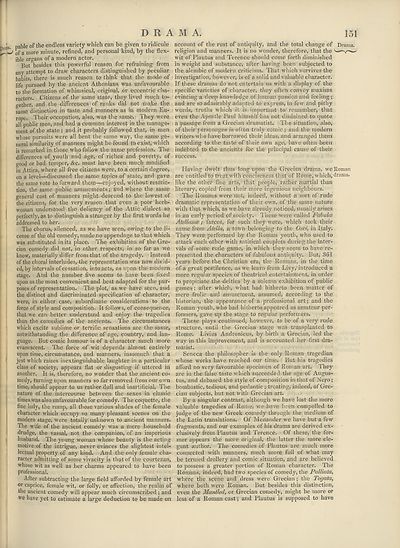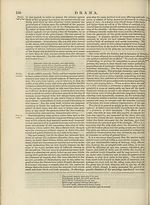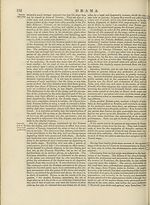Encyclopaedia Britannica > Volume 8, DIA-England
(161) Page 151
Download files
Complete book:
Individual page:
Thumbnail gallery: Grid view | List view

DRAMA.
151
pable of the endless variety which can be given to ridicule
of a more minute, refined, and personal kind, by the flex¬
ible organs of a modern actor.
But besides this powerful reason for refraining from
any attempt to draw characters distinguished by peculiar
habits, there is much reason to think that the mode of
life pursued by the ancient Athenians was unfavourable
to the formation of whimsical, original, or eccentric cha¬
racters. Citizens of the same state, they lived much to¬
gether, and the differences of ranks did not make the
same distinction in taste and manners as in modern Eu¬
rope. Their occupation, also, was the same. They were
all public men, and had a common interest in the manage*
ment of the state ; and it probably followed that, in men
whose pursuits were all bent the same way, the same ge¬
neral similarity of manners might be found to exist, which
is remarked in those who follow the same profession. The
differences of youth and age, of riches and poverty, of
good or bad temper, &c. must have been much modified
in Attica, where all free citizens were, to a certain degree,
on a level—discussed the same topics of state, and gave
the same vote to forward them—enjoyed, without restric¬
tion, the same public amusements; and where the same
general cast of manners might descend to the lowest of
the citizens, for the very reason that even a poor herb-
woman understood the delicacy of the Attic dialect so
perfectly, as to distinguish a stranger by the first words he
addressed to her.
The chorus, silenced, as we have seen, owing to the li¬
cense of the old comedy, made no appendage to that which
was substituted in its place. The exhibition of the Gre¬
cian comedy did not, in other respects, in so far as we
know, materially differ from that of the tragedy. Instead
of the choral interludes, the representation was now divid¬
ed, by intervals of cessation, into acts, as upon the modern
stage. And the number five seems to have been fixed
upon as the most convenient and best adapted for the pur¬
poses of representation. The plot, as we have seen, and
the distinct and discriminated specification of character,
were, in either case, subordinate considerations to the
force of style and composition. It follows, of consequence,
that we can better understand and enjoy the tragedies
than the comedies of the ancients. The circumstances
which excite sublime or terrific sensations are the same,
notwithstanding the difference of age, country, and lan¬
guage. But comic humour is of a character much more
evanescent. The force of wit depends almost entirely
upon time, circumstance, and manners, insomuch that a
jest which raises inextinguishable laughter in a particular
class of society, appears flat or disgusting if uttered in
another. It is, therefore, no winder that the ancient co¬
medy, turning upon manners so far removed from our own
time, should appear to us rather dull and inartificial. The
nature of the intercourse between the sexes in classic
times was also unfavourable for comedy. The coquette, the
fine lady, the romp, all those various shades of the female
character which occupy so many pleasant scenes on the
modern stage, were totally unknown to ancient manners.
The wife of the ancient comedy was a mere household
drudge, the vassal, not the companion, of an imperious
husband. The young woman whose beauty is the acting
motive of the intrigue, never evinces the slightest intel¬
lectual property of any kind. And the only female cha¬
racter admitting of some vivacity is that of the courtezan,
whose wit as well as her charms appeared to have been
professional.
After subtracting the large field afforded by female art
or caprice, female wit, or folly, or affection, the realm of
the ancient comedy will appear much circumscribed; and
we have yet to estimate a large deduction to be made on
account of the rust of antiquity, and the total change of
religion and manners. It is no wonder, therefore, that the
wit of Plautus and Terence should come forth diminished
in weight and substance, after having been subjected to
the alembic of modern criticism. That which survives the
investigation, however, is of a solid and valuable character.
If these dramas do not entertain us with a display of the
specific varieties of character, they often convey maxims
evincing a deep knowledge of human passion and feeling;
and are so admirably adapted to express, in few and pithy
words, truths which it is important to remember, that
even the Apostle Paul himself has not disdained to quote
a passage from a Grecian dramatist. The situation, also,
of their personages is often truly comic; and the modern
writers who have borrowed their ideas, and arranged them
according to the taste of their own age, have often been
indebted to the ancients for the principal cause of their
success.
Drama.
Having dwelt thus long upon the Grecian drama, we Homan
are entitled to treat with conciseness that of Rome, which, drama,
like the other fine arts, that people, rather martial than
literary, copied from their more ingenious neighbours.
The Romans were not, indeed, without a sort of rude
dramatic representation of their own, of the same nature
with that which, as we have already noticed, usually arises
in an early period of society. These were called Fabulcs
Atellanee; farces, for such they were, which took their
name from Atetta, a town belonging to the Osci, in Italy.
They were performed by the Roman youth, who used to
attack each other with satirical couplets during the inter¬
vals of some rude game, in which they seem to have re¬
presented the characters of fabulous antiquity. But, 361
years before the Christian era, the Romans, in the time
of a great pestilence, as we learn from Livy, introduced a
more regular species of theatrical entertainment, in order
to propitiate the deities by a solemn exhibition of public
games; after which, what had hitherto been matter of
mere frolic and amusement, assumed, according to the
historian, the appearance of a professional art; and the
Roman youth, who had hitherto, appeared as amateur per¬
formers, gave up the stage to regular performers.
These plays continued, however, to be of a very rude
structure, until the Grecian stage was transplanted to
Rome. Livius Andronicus, by birth a Grecian, led the
way in this improvement, and is accounted her first dra¬
matist.
Seneca the philosopher is the only Roman tragedian
whose works have reached our time. But his tragedies
afford no very favourable specimen of Roman art. They
are in the false taste which succeeded the age of Augus¬
tus, and debased the style of composition in that of Nero;
bombastic, tedious, and pedantic ; treating, indeed, of Gre¬
cian subjects, but not with Grecian art.
By a singular contrast, although we have lost the more
valuable tragedies of Rome, we have been compelled to
judge of the new Greek comedy through the medium of
the Latin translations. Of Menander we have but a few
fragments, and our examples of his drama are derived ex¬
clusively from Plautus and Terence. Of these, the for¬
mer appears the more original, the latter the more ele¬
gant author. The comedies of Plautus are much more
connected with manners, much more full of what may
be termed drollery and comic situation, and are believed
to possess a greater portion of Roman character. The
Romans, indeed, had two species of comedy, the Palliata,
where the scene and dress were Grecian ; the Togata,
where both were Roman. But besides this distinction,
even the Mantled, or Grecian comedy, might be more or
less of a Roman cast; and Plautus is supposed to have
151
pable of the endless variety which can be given to ridicule
of a more minute, refined, and personal kind, by the flex¬
ible organs of a modern actor.
But besides this powerful reason for refraining from
any attempt to draw characters distinguished by peculiar
habits, there is much reason to think that the mode of
life pursued by the ancient Athenians was unfavourable
to the formation of whimsical, original, or eccentric cha¬
racters. Citizens of the same state, they lived much to¬
gether, and the differences of ranks did not make the
same distinction in taste and manners as in modern Eu¬
rope. Their occupation, also, was the same. They were
all public men, and had a common interest in the manage*
ment of the state ; and it probably followed that, in men
whose pursuits were all bent the same way, the same ge¬
neral similarity of manners might be found to exist, which
is remarked in those who follow the same profession. The
differences of youth and age, of riches and poverty, of
good or bad temper, &c. must have been much modified
in Attica, where all free citizens were, to a certain degree,
on a level—discussed the same topics of state, and gave
the same vote to forward them—enjoyed, without restric¬
tion, the same public amusements; and where the same
general cast of manners might descend to the lowest of
the citizens, for the very reason that even a poor herb-
woman understood the delicacy of the Attic dialect so
perfectly, as to distinguish a stranger by the first words he
addressed to her.
The chorus, silenced, as we have seen, owing to the li¬
cense of the old comedy, made no appendage to that which
was substituted in its place. The exhibition of the Gre¬
cian comedy did not, in other respects, in so far as we
know, materially differ from that of the tragedy. Instead
of the choral interludes, the representation was now divid¬
ed, by intervals of cessation, into acts, as upon the modern
stage. And the number five seems to have been fixed
upon as the most convenient and best adapted for the pur¬
poses of representation. The plot, as we have seen, and
the distinct and discriminated specification of character,
were, in either case, subordinate considerations to the
force of style and composition. It follows, of consequence,
that we can better understand and enjoy the tragedies
than the comedies of the ancients. The circumstances
which excite sublime or terrific sensations are the same,
notwithstanding the difference of age, country, and lan¬
guage. But comic humour is of a character much more
evanescent. The force of wit depends almost entirely
upon time, circumstance, and manners, insomuch that a
jest which raises inextinguishable laughter in a particular
class of society, appears flat or disgusting if uttered in
another. It is, therefore, no winder that the ancient co¬
medy, turning upon manners so far removed from our own
time, should appear to us rather dull and inartificial. The
nature of the intercourse between the sexes in classic
times was also unfavourable for comedy. The coquette, the
fine lady, the romp, all those various shades of the female
character which occupy so many pleasant scenes on the
modern stage, were totally unknown to ancient manners.
The wife of the ancient comedy was a mere household
drudge, the vassal, not the companion, of an imperious
husband. The young woman whose beauty is the acting
motive of the intrigue, never evinces the slightest intel¬
lectual property of any kind. And the only female cha¬
racter admitting of some vivacity is that of the courtezan,
whose wit as well as her charms appeared to have been
professional.
After subtracting the large field afforded by female art
or caprice, female wit, or folly, or affection, the realm of
the ancient comedy will appear much circumscribed; and
we have yet to estimate a large deduction to be made on
account of the rust of antiquity, and the total change of
religion and manners. It is no wonder, therefore, that the
wit of Plautus and Terence should come forth diminished
in weight and substance, after having been subjected to
the alembic of modern criticism. That which survives the
investigation, however, is of a solid and valuable character.
If these dramas do not entertain us with a display of the
specific varieties of character, they often convey maxims
evincing a deep knowledge of human passion and feeling;
and are so admirably adapted to express, in few and pithy
words, truths which it is important to remember, that
even the Apostle Paul himself has not disdained to quote
a passage from a Grecian dramatist. The situation, also,
of their personages is often truly comic; and the modern
writers who have borrowed their ideas, and arranged them
according to the taste of their own age, have often been
indebted to the ancients for the principal cause of their
success.
Drama.
Having dwelt thus long upon the Grecian drama, we Homan
are entitled to treat with conciseness that of Rome, which, drama,
like the other fine arts, that people, rather martial than
literary, copied from their more ingenious neighbours.
The Romans were not, indeed, without a sort of rude
dramatic representation of their own, of the same nature
with that which, as we have already noticed, usually arises
in an early period of society. These were called Fabulcs
Atellanee; farces, for such they were, which took their
name from Atetta, a town belonging to the Osci, in Italy.
They were performed by the Roman youth, who used to
attack each other with satirical couplets during the inter¬
vals of some rude game, in which they seem to have re¬
presented the characters of fabulous antiquity. But, 361
years before the Christian era, the Romans, in the time
of a great pestilence, as we learn from Livy, introduced a
more regular species of theatrical entertainment, in order
to propitiate the deities by a solemn exhibition of public
games; after which, what had hitherto been matter of
mere frolic and amusement, assumed, according to the
historian, the appearance of a professional art; and the
Roman youth, who had hitherto, appeared as amateur per¬
formers, gave up the stage to regular performers.
These plays continued, however, to be of a very rude
structure, until the Grecian stage was transplanted to
Rome. Livius Andronicus, by birth a Grecian, led the
way in this improvement, and is accounted her first dra¬
matist.
Seneca the philosopher is the only Roman tragedian
whose works have reached our time. But his tragedies
afford no very favourable specimen of Roman art. They
are in the false taste which succeeded the age of Augus¬
tus, and debased the style of composition in that of Nero;
bombastic, tedious, and pedantic ; treating, indeed, of Gre¬
cian subjects, but not with Grecian art.
By a singular contrast, although we have lost the more
valuable tragedies of Rome, we have been compelled to
judge of the new Greek comedy through the medium of
the Latin translations. Of Menander we have but a few
fragments, and our examples of his drama are derived ex¬
clusively from Plautus and Terence. Of these, the for¬
mer appears the more original, the latter the more ele¬
gant author. The comedies of Plautus are much more
connected with manners, much more full of what may
be termed drollery and comic situation, and are believed
to possess a greater portion of Roman character. The
Romans, indeed, had two species of comedy, the Palliata,
where the scene and dress were Grecian ; the Togata,
where both were Roman. But besides this distinction,
even the Mantled, or Grecian comedy, might be more or
less of a Roman cast; and Plautus is supposed to have
Set display mode to:
![]() Universal Viewer |
Universal Viewer | ![]() Mirador |
Large image | Transcription
Mirador |
Large image | Transcription
Images and transcriptions on this page, including medium image downloads, may be used under the Creative Commons Attribution 4.0 International Licence unless otherwise stated. ![]()
| Encyclopaedia Britannica > Encyclopaedia Britannica > Volume 8, DIA-England > (161) Page 151 |
|---|
| Permanent URL | https://digital.nls.uk/193325098 |
|---|
| Attribution and copyright: |
|
|---|
| Description | Ten editions of 'Encyclopaedia Britannica', issued from 1768-1903, in 231 volumes. Originally issued in 100 weekly parts (3 volumes) between 1768 and 1771 by publishers: Colin Macfarquhar and Andrew Bell (Edinburgh); editor: William Smellie: engraver: Andrew Bell. Expanded editions in the 19th century featured more volumes and contributions from leading experts in their fields. Managed and published in Edinburgh up to the 9th edition (25 volumes, from 1875-1889); the 10th edition (1902-1903) re-issued the 9th edition, with 11 supplementary volumes. |
|---|---|
| Additional NLS resources: |
|

